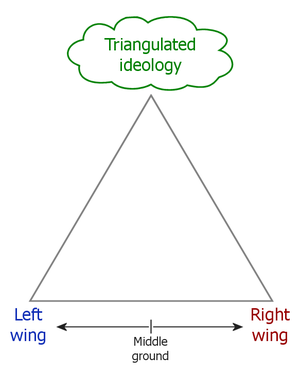- Triangulation (politics)
-
Triangulation is the name given to the act of a political candidate presenting his or her ideology as being "above" and "between" the "left" and "right" sides (or "wings") of a traditional (e.g. UK or US) democratic "political spectrum". It involves adopting for oneself some of the ideas of one's political opponent (or apparent opponent). The logic behind it is that it both takes credit for the opponent's ideas, and insulates the triangulator from attacks on that particular issue. Opponents of triangulation[who?], who believe in a fundamental "left" and "right", consider the dynamic a deviation from its "reality" and dismiss those that strive for it as whimsical.
Contents
Origins within Clinton Presidency
The term was first used by President of the United States Bill Clinton's chief political advisor Dick Morris as a way to describe his strategy for getting Clinton reelected in the 1996 presidential election. It is often referred to as "Clintonian triangulation". Morris advocated a set of policies that were different from the traditional policies of the Democratic Party. These policies included deregulation and balanced budgets. One of the most widely cited capstones of Clinton's triangulation strategy was when, in his 1996 State of the Union Address, Clinton declared that the "era of big government is over."[1]
Recent use
Politicians alleged to have used triangulation more recently include US President Barack Obama[2][3], former Senator Hillary Clinton, Tony Blair with "New Labour" in the United Kingdom, Jean Chrétien and Paul Martin with the Liberal Party of Canada, Fredrik Reinfeldt with "The New Moderates" in Sweden, and Bob Hawke, Paul Keating, and Kevin Rudd of the Australian Labor Party. In France, the Socialist candidate in the 2007 presidential election, Ségolène Royal, advocated “military supervision” (encadrement militaire) for first offenders.
Criticism
Some members of the U.S. Democratic Party, in particular the left, insist that triangulation is "dead." They cite the attempted uses of triangulation by Democrats in the 2000 and 2004 U.S. presidential elections. In the 2000 presidential election, Al Gore's call for more military spending than those of opponent George W. Bush was seen[by whom?] more as an admission that Bush was correct on the issue.[citation needed] The use of triangulation by John Kerry in the 2004 presidential election, in such areas as the Iraq War, resulted in "flip-flopping" charges.[citation needed] It also forced Kerry to defend positions that he took which he may or may not have held.[citation needed] During the 2010 State of the Union Address, President Obama insisted that he would remain with his agenda in the face of criticism, rather than resort to triangulation.[1]
However, the campaign of President Barack Obama made expert use of triangulation. In his book, The Audacity of Hope, Obama wrote, "It was Bill Clinton that recognized the categories of conservative and liberal played to Republican advantage and were inadequate to address our problems. Clinton's third way... tapped into the pragmatic, nonideological attitude of Americans."
In a recent piece in the New Republic[4], Jonathan Chait writes Obama's "rhetoric removes the locus of debate from the realm of tribal conflict-- red state versus blue state, Islam versus America--and puts it onto specific questions--Is the American health care system fair? Is terrorism justified?-- where Obama believes he can win support from soft adherents of the opposing camp."
The term "triangulation" is often used as a pejorative, sometimes in reference to the New Democrat movement. Progressive critics argue that triangulation has led to multiple electoral defeats and eroded the principles of those who use the strategy. However, it should be pointed out New Democrat Bill Clinton won the White House twice - the first for a Democrat since Franklin Roosevelt - and New Democrats made significant gains in both the 2006 midterms and the 2008 elections.[5]. Similarly, in the UK, the Labour party under Tony Blair won its first ever third term in government in 2005. In May of 2009, President Obama declared to the House New Democrat Coalition, "I am a New Democrat."[6]
See also
References
- ^ a b Sanger, David E. (2010-01-29). "Where Clinton Turned Right, Obama Plowed Ahead". The New York Times. http://www.nytimes.com/2010/01/29/us/politics/29sanger.html. Retrieved 2010-05-26.
- ^ How tax cut revolt helps Obama: It's a page from Clinton playbook "Perhaps President Obama's tax-cut deal with the GOP was astute, after all. While he angered liberals, he also won back some independent support – an example of Clintonian 'triangulation.'"
- ^ "Matt Frei's diary: Groundhog Day". BBC News. 2010-02-03. http://news.bbc.co.uk/2/hi/programmes/world_news_america/8494796.stm. Retrieved 2010-05-26.
- ^ http://www.tnr.com/politics/story.html?id=bce35bd2-5d49-4296-893e-c77e9df19938
- ^ http://tauscher.house.gov/ndc/index.php?option=com_content&task=view&id=127&Itemid=61
- ^ http://www.politico.com/news/stories/0309/19862.html
Categories:- Political terms
Wikimedia Foundation. 2010.

